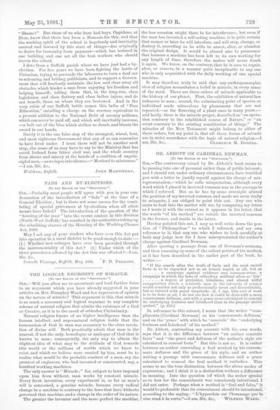THE LOGICAL NECESSITY OF MIRACLE.
[To THE EDI 10E OF THE "SPECTATOR.,.)
you allow me to accentuate and lend further force to an argument which you have already suggested in your articles on Mrs. Humphry Ward and her expression of opinion on the nature of miracle P This argument is this, that miracle is as much a necessary and logical sequence to any complete scheme of natural religion that admits the existence of a God or Creator, as it is to the creed of orthodox Christianity.
Natural religion knows of no higher intelligence than the `human intellect, and supernatural religion holds that the incarnation of God in man was necessary to the clear revela- tion of divine will. Both practically admit that man is the nearest, if not the only, homologue or analogue of God that is known to man ; consequently, the only way to obtain the slightest idea of what may be the attitude of God towards this world or the millions of worlds which we know to exist, and which we believe were created by him, must be to realise what would be the probable conduct of a man, say the greatest of engineers, who had invented or constructed, say, a hundred working machines.
The only answer is " Miracle ;" for, subject to laws imposed upon him from without, man works by constant miracle. Every fresh invention, every experiment is, so far as man's will is concerned, a genuine miracle, because every radical change in a machine is contrary to the laws that have hitherto governed that machine, and a change in the order of its nature.
The greater the inventor and the more perfect the machine, the less occasion might there be for interference ; but even if the man has invented a self-acting machine, it is quite certain that sooner or later he will interfere, and will stop, change, or destroy it, according as he wills to arrest, alter, or abandon the original design. It would be absurd also to pronounce that because a machine has been left to its own working for any length of time, therefore the maker will never touch it again. We know, on the contrary, that he is sure to repair, alter, or remove, in a manner quite inexplicable to any one who is only acquainted with the daily working of one special machine.
It may therefore truly be said that any anthropomorphic view of religion necessitates a belief in miracle, in every sense of the word. There are three orders of miracle applicable to the history of our planet. First, the exhibition of natural law unknown to man ; second, the culminating point of species or individual made miraculous by phenomena that are not repeated,—as the flowering of a plant once in many years ;— and lastly, there is the miracle proper, described as " an opera- tion contrary to the established course of Nature," or "an event contrary to the existing constitution of things." The miracles of the New Testament might belong to either of these orders, but my point is, that all these forms of miracle are in strict accordance with the logic of natural religion.—I


































 Previous page
Previous page